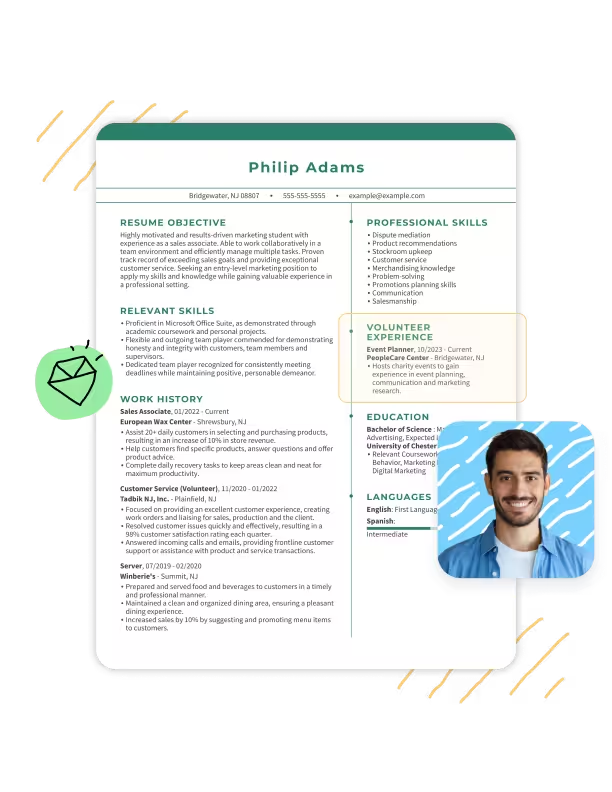Your resume tells your professional story — and that story includes more than just paid positions.
Let’s explore how volunteering can strengthen your resume.
This guide will cover:
- Whether you should include volunteer work on your resume.
- How to list volunteer work correctly.
- Placing your volunteer work in the right spot.
- Frequently asked questions about volunteer work.
Related Guides & Tips
Browse other popular samples
Should you include volunteer work on your resume?
Yes. In general, volunteer experience is worth including on your resume.
Think about it — whether in a workplace or just helping out, you use skills to accomplish a task. That’s exactly what employers care about. It’s fine if you weren’t paid for it!
A survey by LinkedIn found that 41% of employers consider volunteer work equally as valuable as paid work experience when evaluating candidates.
Listing volunteer work is especially important if you fall into one of these categories:
- You’re an entry-level candidate.
- You have no work experience to add to your resume.
- You’re a student who hasn’t held a job.
- You have significant career gaps on your resume.
- You’d consider yourself a career changer.
You don’t need to fit into one of the groups above to talk about your volunteering experience, though. Anyone with relevant experience should consider it alongside other sections you put on your resume.
While volunteer experiences are generally welcome, there are a couple of situations where you’d rather leave it off.
Don’t include your volunteer work experience if it fits the following:
- Your experience isn’t relevant. If the volunteer work you’ve done doesn’t align with the job you’re applying for, it might not be worth including. For instance, if you’re applying for a role in finance but your volunteer experience is all in animal care, this mismatch could distract rather than enhance your application.
- Your experience was long ago. Consider omitting volunteer experiences that are outdated, especially if they are more than 10-15 years old. Old experiences may not reflect your current skills and abilities.
- You need space for other sections. If you did relevant coursework, you could give more space to your education section. Perhaps you have a lot of recent work experience, so your job history should take center stage.
Now, let’s talk about the best ways to showcase these experiences effectively.
How to list volunteer experience on your resume
Listing volunteer work on your resume is simple — it should look like your work experience.
This means your volunteer experience should always include:
- Volunteering positions: Clearly state your role or the position you held.
- Organization name: Include the name of the organization or group where you volunteered.
- City and state: Mention the location where you volunteered.
- Dates of volunteering: Provide the timeframe of your volunteer engagement, including the start and end dates.
- Bullet points calling out achievements: List your key responsibilities, achievements and any notable contributions you made during your volunteer work, using bullet points for easy readability.
Let’s see what this looks like in practice.
Example of a volunteer work section
Event Coordinator
Food Bank, Brooklyn, NY
June 2021 – Present
- Led a team of 20 volunteers in organizing monthly food drives, effectively feeding over 500 families each month.
- Coordinate with local businesses to secure food donations, increasing the variety of food items available by 30%.
- Develop and manage a volunteer scheduling system, ensuring smooth operations and efficient use of resources.
Pro tip:When describing your volunteer experience, use action words like “led,” “coordinated,” and “developed” to drive home your experience. These action verbs showcase your leadership, initiative and impact more vividly.
See our resume formatting guide for more tips and examples of how to format your resume.
Next, we’ll show you where you should place your volunteer experience.
Where to add volunteer experience on your resume
Deciding where to place volunteer experience on your resume can affect how this information is perceived by potential employers.
There are two ways you can add volunteer experience to your resume:
- In the work experience section: This is a good choice when the volunteer work is major and relevant to your career goals. Including it in your work experience section can demonstrate a continuous and relevant work history, especially if the skills or role closely align with your professional experiences.
- In a separate section with its own header: Opt for this when your volunteer experience wasn’t long-term or substantial or doesn’t necessarily connect directly to your career goals. This approach allows you to highlight these experiences without confusing them with your professional work history.
Let’s look at how each of these options would look on your resume.
Work experience section — example
Work Experience
Marketing Coordinator (Volunteer)
Literacy for All, Portland, OR
March 2022 – Present
- Developed and implemented a social media strategy that increased follower engagement by 40%.
- Organize and promote fundraising events, so far contributing to a 25% increase in annual donations.
- Collaborate with local businesses for sponsorship, enhancing community involvement and support.
Dedicated section — example
Volunteer Experience
Event Organizer
Annual Charity Run, Burlington, VT
May 2021
- Successfully planned and executed a city-wide charity run with over 300 participants.
- Managed event logistics, including route planning, registration and volunteer staffing.
- Raised $10,000 for local charities, exceeding fundraising goals by 15%.
Tutor
Burlington Community Center, Burlington, VT
September 2020 – December 2020
- Provided weekly math tutoring to high school students, contributing to improved academic performance.
- Developed individualized learning plans to address each student’s unique challenges and strengths.
OK, let’s wrap up by answering a few common questions.
Volunteer work FAQ
Last Updated: January 02, 2025
Volunteer work is important because it showcases your commitment to community and social responsibility. Plus, it provides an opportunity to develop new skills and gain experiences that might not be available through paid employment.
Skills you could hone while volunteering range from hard skills, like event planning and digital marketing, to soft skills, like empathy and effective communication.
Most importantly, volunteering can show how you apply your hard and soft skills in real life, a valuable quality in any professional setting.
Absolutely! Many employers value volunteer work.
Employers are especially impressed when the volunteering is relevant to the job you’re applying for. They often view volunteer work as evidence of a strong work ethic, adaptability and a willingness to take on new challenges.
Volunteering also reflects well on your character, suggesting a well-rounded individual with a sense of community and social responsibility.
Volunteer work benefits you in several ways:
- Skill development: It can help you learn new skills or further develop existing ones, particularly in areas like leadership, communication, problem-solving and teamwork, as well as computer skills.
- Networking: Volunteering opens up opportunities to meet new people, including professionals in your field of interest, which can be valuable for networking.
- Personal fulfillment: Knowing you’re contributing positively to society often provides a sense of achievement and personal satisfaction.
- Career exploration: For those considering a career change, volunteering can offer a risk-free way to explore new fields.
Any unpaid work can count as volunteer work. Here are some examples to consider adding to your resume:
- Community service: Participating in local community clean-ups, food drives or helping in community centers.
- Nonprofit organizations: Assisting nonprofit entities like animal shelters, libraries or museums.
- Event volunteering: Helping organize and run charity events, festivals or community gatherings.
- Skill-based volunteering: Offering your professional skills pro bono to organizations or causes, like legal advice, marketing or web development.
- Board membership: Serving on the boards of nonprofits or community organizations, contributing to strategic planning and decision-making.
- Mentoring and coaching: Supporting individuals as a mentor or coach in educational, professional or personal development areas.
On LinkedIn, you can add volunteer work in the “Volunteer Experience” section of your profile.
This section is specifically designed to showcase your volunteer activities separately from your professional work experience. To add it, go to your profile, click on the “Add profile section” button, select “Volunteer Experience” and fill in the details of your volunteer roles. Remember to include the organization, your role, the time period you volunteered and a brief description of your responsibilities and achievements.
Of course, if you’d rather include your volunteer work alongside your other roles, you can simply add the details by editing your “Experience” section.
Was this information about How To List Volunteer Work On Your Resume [+ Examples] helpful? Let us know!
Don is a Certified Professional Resume Writer (CPRW) with more than 10 years’ experience creating digital content, including four years helping job seekers develop their careers. He holds an M.S. in Journalism from Northwestern University.
More resources

How to Improve Your Resume: 10 Tips to Make Your Resume Stronger
Need help turning your out-of-date resume into a new and impro...

Resumes for Older Workers: 13 Tips + Examples to Help You Succeed
Need help positioning your resume for success as an older work...

Statement of Qualifications: Template & Examples
Learn how to write a statement of qualifications with examples...

Network Engineer Resume: Examples, Templates & Tips
Are you skilled with networking technology? Use our network en...

HR Specialist Resume: Examples, Templates & Tips for 2025
Use our guide and examples to write your next HR specialist re...

Sales Planner Resume: Examples, Templates & Tips for 2025
Whether you re an experienced professional or just starting ...

